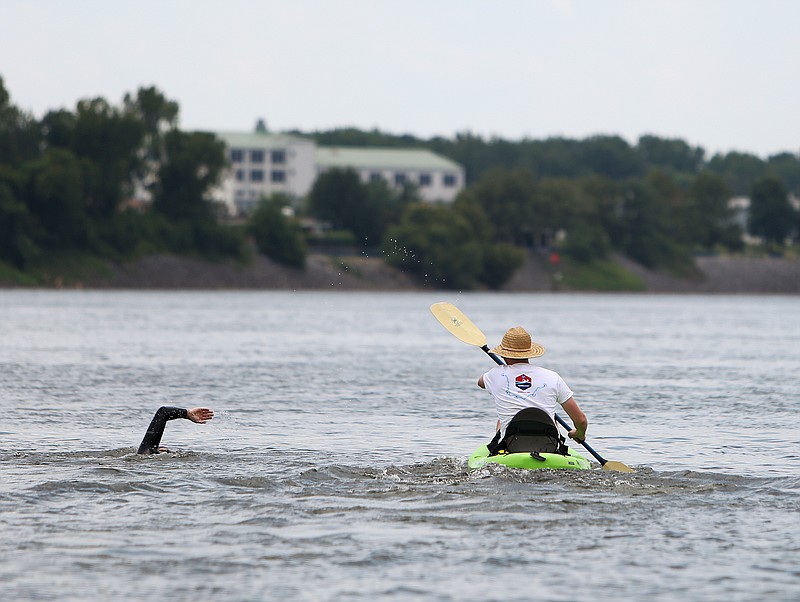We wouldn't be Chattanooga without the Tennessee River.
The river is our revered and beautiful best-face-forward, the symbolic lifeblood of our economic and cultural emergence. All things run through it.
One of the wonders of the South, the Tennessee River been called an underwater rainforest by some scientists. Home to some 1,400 aquatic species and 75 percent of all our nation's native fish, the rivershed holds 75 percent of North America's salamander species and half its turtles, according to the Tennessee Aquarium.
And it is sick.
And polluted.
This means only one thing:
We need another Cronkite moment.
Nearly 50 years ago, CBS anchor Walter Cronkite revealed to the nation that Chattanooga had the dirtiest air, according to the Environmental Protection Agency. The moment propelled a sort of environmental come-to-Jesus moment - we had to clean up our act.
Now, the crisis isn't pollution in our air, but plastic in our river.
"A plastic pandemic," claims the Tennessee Aquarium.
How bad is it? Earlier this summer, a German scientist swam the entire 652-mile Tennessee River, taking daily water samples along the way.
In October, he announced his findings at the aquarium.
"It is not a healthy river at all," declared Dr. Andreas Fath of Furtwangen University in Schwarzwald.
Compared to Germany's Rhine River - Fath also swam-studied it - our river has some 8,000 percent higher concentrations of micro-plastics.
China's Yangtze River? It's believed to produce more than half of all plastic entering our global oceans.
Our Tennessee River has an 80 percent higher concentration of micro-plastics than the Yangtze.
"I did not expect such high levels of micro-plastics," Fath said. "We triple-checked the results."
Plastic is like our unofficial state animal. It's everywhere.
And recycling rates in Tennessee are sorry; we consume some four billion bottles a year, yet recycle only 10 percent. So unrecycled plastic trashed into ditches and landfills degrades into micro-plastic, seeping into creeks, streams and, ultimately, the river.
Try to go one day without plastic. Try one hour. Plastic is ubiquitous: plastic bottles, plastic straws, plastic containers, plastic jugs, plastic everything. Within five minutes of waking, I can't escape it: the container that holds my coffee, the sleeve that wraps my driveway newspaper, the liner in my cereal box.
That plastic straw in your drink?
It will outlive your great-great-great-grandchildren.
"They persist on our planet for hundreds of years - breaking down into smaller and smaller pieces without being assimilated back into the environment. This means it's likely that almost every plastic straw ever used is still with us, either on land or in the ocean," claim the authors of the In Our Hands plastic pledge.
The Plastic Pledge is one of several solutions designed by a national consortium of aquariums.
First, skip the straws you don't need.
(Sure, straws are tiny, but when we become observant about a small straw, we then become observant about other, larger things.)
Second, encourage restaurants to give straws only when requested.
Then, take a seven-day plastic free pledge. (Visit pledge.ourhands.org.)
Then, contact local and state leaders. (Visit capitol.tn.gov.)
One of the best things to encourage?
TennCan, our state's bottle bill.
This fabulous legislation would add five cents to the check-out cost of a bottle or can, which is then recouped when you return that bottle or can - or all the other cans and bottles you collect - to your local redemption center. (Built using the revenue from the extra nickel paid on every bottle.)
It'll encourage us to recycle more.
By bringing in our buddy's six-pack, we'll make some extra cash.
Best of all, the redemption center is connected to a specific nonprofit. Instead of keeping your nickels, you can donate it to an animal shelter, library or youth group instead.
Bottle bills are among the most popular legislation in the nation, and not long ago Ivy Academy hosted a public meeting encouraging the legislation.
The day is coming when single-use plastics will be seen in the same way we now view smoking and not buckling up.
If we are who we say we are - an Outdoor City of America - then we must love our river by changing our relationship to plastic.
"Plastic is a smart and important material in industries with a lot of economic benefits," Fath says. "We appreciate its durability, but it is madness to use this non-degradable material for packaging of articles which are only used for minutes or hours. If we do not change that, we are going to wrap up the world with plastic."
David Cook writes a Sunday column and can be reached at dcook@timesfreepress.com or 423-757-6329.

